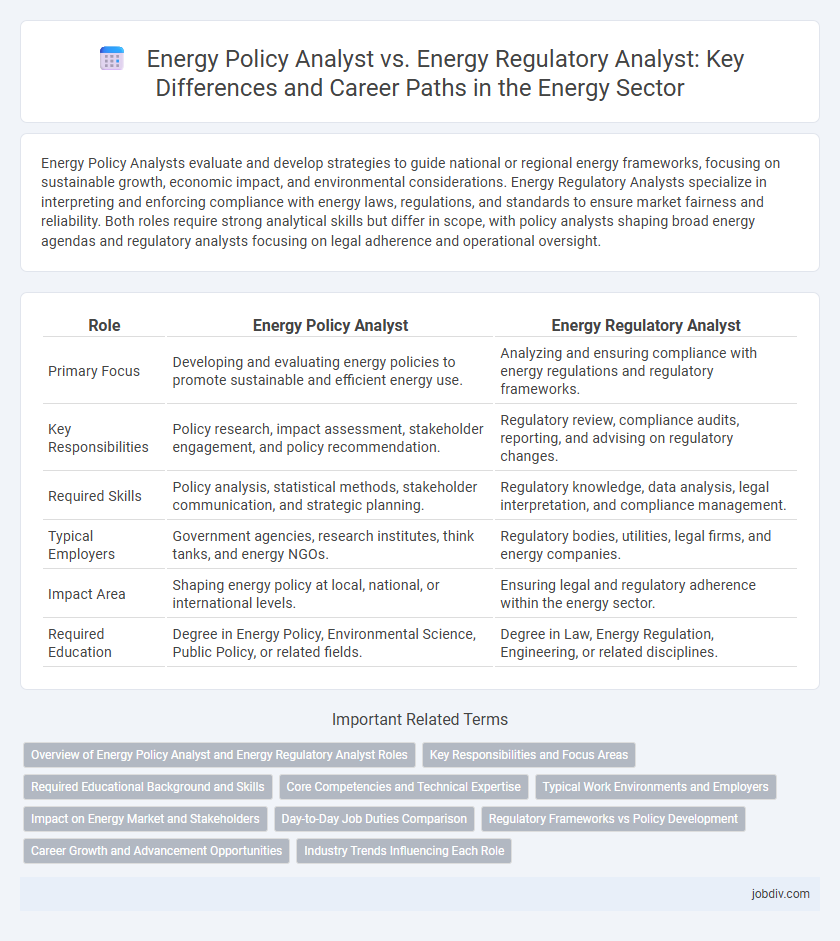Energy Policy Analysts evaluate and develop strategies to guide national or regional energy frameworks, focusing on sustainable growth, economic impact, and environmental considerations. Energy Regulatory Analysts specialize in interpreting and enforcing compliance with energy laws, regulations, and standards to ensure market fairness and reliability. Both roles require strong analytical skills but differ in scope, with policy analysts shaping broad energy agendas and regulatory analysts focusing on legal adherence and operational oversight.
Table of Comparison
| Role | Energy Policy Analyst | Energy Regulatory Analyst |
|---|---|---|
| Primary Focus | Developing and evaluating energy policies to promote sustainable and efficient energy use. | Analyzing and ensuring compliance with energy regulations and regulatory frameworks. |
| Key Responsibilities | Policy research, impact assessment, stakeholder engagement, and policy recommendation. | Regulatory review, compliance audits, reporting, and advising on regulatory changes. |
| Required Skills | Policy analysis, statistical methods, stakeholder communication, and strategic planning. | Regulatory knowledge, data analysis, legal interpretation, and compliance management. |
| Typical Employers | Government agencies, research institutes, think tanks, and energy NGOs. | Regulatory bodies, utilities, legal firms, and energy companies. |
| Impact Area | Shaping energy policy at local, national, or international levels. | Ensuring legal and regulatory adherence within the energy sector. |
| Required Education | Degree in Energy Policy, Environmental Science, Public Policy, or related fields. | Degree in Law, Energy Regulation, Engineering, or related disciplines. |
Overview of Energy Policy Analyst and Energy Regulatory Analyst Roles
Energy Policy Analysts evaluate legislation, regulatory frameworks, and market trends to develop strategies that promote sustainable energy production and consumption. Energy Regulatory Analysts specialize in interpreting and applying regulations set by governmental agencies to ensure compliance within energy markets and infrastructure projects. Both roles require strong analytical skills but focus on different aspects: policy development versus regulatory enforcement.
Key Responsibilities and Focus Areas
Energy Policy Analysts primarily focus on evaluating and developing energy policies that impact sustainability, market trends, and environmental regulations. Energy Regulatory Analysts concentrate on compliance with government regulations, monitoring utility rates, and ensuring adherence to energy laws and standards. Both roles require in-depth knowledge of energy markets, but Energy Policy Analysts emphasize strategic policy formation while Regulatory Analysts prioritize regulatory enforcement and stakeholder engagement.
Required Educational Background and Skills
Energy Policy Analysts typically require a bachelor's degree in environmental science, public policy, or energy management, coupled with strong skills in data analysis, policy evaluation, and stakeholder communication. Energy Regulatory Analysts often hold degrees in law, economics, or engineering and need expertise in regulatory compliance, legal frameworks, and technical assessment of energy systems. Both roles demand proficiency in critical thinking and familiarity with energy market trends and sustainability practices.
Core Competencies and Technical Expertise
Energy Policy Analysts excel in developing strategic frameworks and evaluating the impact of legislation on energy markets, requiring strong skills in economic modeling, policy analysis, and stakeholder engagement. Energy Regulatory Analysts specialize in compliance monitoring and regulatory reporting within energy sectors, demanding expertise in regulatory codes, risk assessment, and technical documentation. Both roles necessitate proficiency in data analysis and understanding of energy systems but diverge in focus areas--policy formulation versus regulatory enforcement.
Typical Work Environments and Employers
Energy Policy Analysts typically work in government agencies, research institutes, and think tanks focused on shaping and evaluating energy policies to promote sustainable practices. Energy Regulatory Analysts are often employed by utility companies, regulatory bodies, and legal firms where they assess compliance with energy regulations and analyze the impact of regulatory changes on market operations. Both roles demand collaboration with stakeholders but differ in environments, with policy analysts oriented towards public sector and advocacy settings, while regulatory analysts concentrate on industry-specific regulatory frameworks.
Impact on Energy Market and Stakeholders
Energy Policy Analysts shape regulatory frameworks and policy initiatives that influence market dynamics and stakeholder behavior, driving shifts in energy production, consumption, and sustainability goals. Energy Regulatory Analysts focus on compliance, monitoring market operations, and ensuring adherence to regulations, directly impacting the stability, fairness, and transparency of energy markets. Both roles are critical for balancing innovation, market efficiency, and stakeholder interests within the evolving energy sector.
Day-to-Day Job Duties Comparison
Energy Policy Analysts conduct research and analyze data to develop and recommend energy policies that promote sustainability and economic efficiency. Energy Regulatory Analysts focus on monitoring compliance with energy regulations, preparing reports for regulatory bodies, and advising on regulatory impacts to ensure adherence to legal standards. Both roles require strong analytical skills, but Policy Analysts emphasize policy formulation, while Regulatory Analysts prioritize regulatory enforcement and reporting.
Regulatory Frameworks vs Policy Development
Energy Policy Analysts specialize in developing strategic frameworks and recommending policies to promote sustainable energy use and innovation. Energy Regulatory Analysts focus on compliance, interpreting existing regulations, and advising on the implementation of regulatory frameworks within the energy sector. Both roles are critical for balancing energy market stability with evolving legislative and environmental standards.
Career Growth and Advancement Opportunities
Energy Policy Analysts typically experience broader career growth by influencing legislation, shaping sustainable energy initiatives, and advancing to strategic advisory roles or governmental leadership positions. Energy Regulatory Analysts specialize in compliance and regulatory frameworks, offering advancement through expertise in regulatory affairs, risk management, and roles within regulatory commissions or legal consulting firms. Both career paths offer strong growth, but Energy Policy Analysts often access higher-level policymaking opportunities while Energy Regulatory Analysts build niche expertise essential for regulatory and compliance leadership.
Industry Trends Influencing Each Role
Energy Policy Analysts focus on evolving government regulations, climate change initiatives, and sustainability goals shaping national and international energy frameworks. Energy Regulatory Analysts primarily monitor compliance with utility regulations, tariff structures, and market operations driven by shifts in energy deregulation and grid modernization. Industry trends such as increased renewable integration and advances in smart grid technology distinctly influence the responsibilities and analytical focus of each role.
Energy Policy Analyst vs Energy Regulatory Analyst Infographic

 jobdiv.com
jobdiv.com